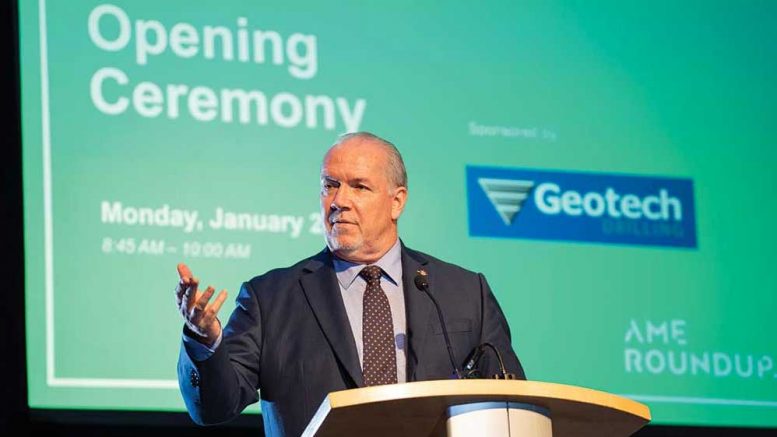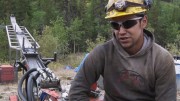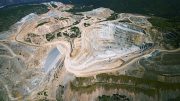VANCOUVER — Miners and explorers in British Columbia hit paydirt on Monday, with B.C. Premier John Horgan announcing that two investment-friendly tax credits would be made permanent and no longer be re-evaluated on an annual basis.
Speaking at Roundup 2019, the annual meet-up organized by the Association for Mineral Exploration (AME), Horgan said his government will adopt the recommendations of the Mining Jobs Task Force in making the Mining Flow-Through Share (MFTS) tax credit, and the B.C. Mining Exploration Tax Credit (METC) permanent incentives to support investment in mining.
The MFTS provides a non-refundable B.C. income tax credit to individuals who have purchased flow-through shares from a B.C. mining company. The tax credit is worth 20% of mining expenditures that the mining company flows through to the individual.
The METC is a refundable B.C. income tax credit for eligible individuals and corporations conducting grassroots mineral exploration in B.C., and is worth 20 or 30% of qualified mining exploration expenditures.
“We are making these tax credits permanent, something the previous government would not do,” Horgan stated in a press release, which notes that mining and related sectors provide jobs for over 30,000 people and a production value worth more than $8 billion.
Edie Thome, AME president and CEO, responded that AME is “pleased that the provincial government is living up to their commitment to support the mineral exploration and mining industry and its future in this province.”
Horgan’s government, an NDP-Green Party coalition, has also pledged to: add more resources to the Ministry of Energy, Mines and Petroleum Resources, to improve mining application processes and industry safety and oversight; commit $1 million to working with industry and governments to develop a “mining innovation roadmap”; and provide another $1 million for the Regional Mining Alliance, which promotes mineral exploration, indigenous partnerships and mining in British Columbia.
The four initiatives announced by the premier were part of 25 recommendations from the B.C. Mining Jobs Task Force, a 12-member group chosen to review exploration and mining, and to advise the government, which took power in 2017 following a 16-year reign by the B.C. Liberals. The task force submitted its report to government in December.
Speaking at the opening ceremony of Roundup, Horgan told the audience the mining industry is well-placed to carry out reconciliation with B.C. First Nations, considering that, “mineral exploration, explorers, miners are on the front lines in rural B.C. interacting with indigenous communities all the time, and there are no better ambassadors, in my opinion, than those that are there all the time.”
Concerning the mining innovation roadmap, he mentioned Teck Resources, (TSX: TECK.B; NYSE: TECK) which is working with MineSense, a mining supplier that has a shovel sensor to tell the difference between waste rock and ore; and LlamaZOO, a mining software provider.
In a separate announcement, a representative from the federal ministry Natural Resources Canada (NRCan) said NRCan will spend a total of $4.2 million on two TUGLIQ Energy Corporation projects in Nunavut and Quebec that are meant to reduce reliance on diesel fuel.
NRCan will put $3.9 million into RAGLAN 2.0, for expanding Nunavik’s first renewable energy production and storage centre for 16 regional mining operations and Inuit communities. The Raglan mine is a large nickel mining complex operated by Glencore (LON: GLEN) in the Nunavik region of northern Quebec.
The second expenditure of $283,000 will enable TUGLIQ to complete a front-end engineering and design study to integrate compressed air energy storage with its operations, enabling increased use of wind energy at a Nunavut mine.
Both projects are being funded through NRCan’s Energy Innovation Program, which received $49 million over three years to support clean energy innovation.
“Today’s investments will help reduce reliance on diesel fuel and transform the energy landscape in Canada’s Arctic region. Our government is proud to support projects that will improve the region’s long-term economic stability and energy security, while reducing pollution and the environmental footprint of Canada’s northern mining operations and communities,” said Paul Lefebvre, parliamentary secretary to Canada’s Minister of Natural Resources.






Be the first to comment on "AME Roundup: BC exploration tax credits made permanent"